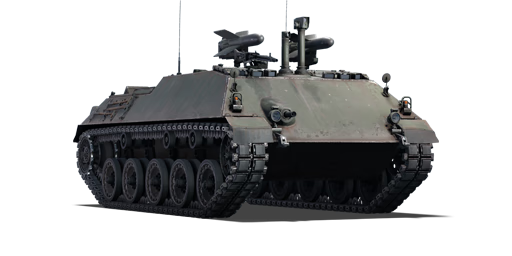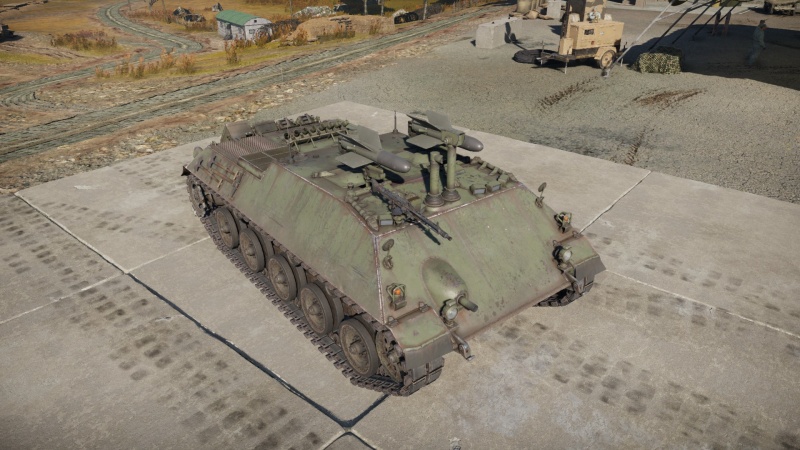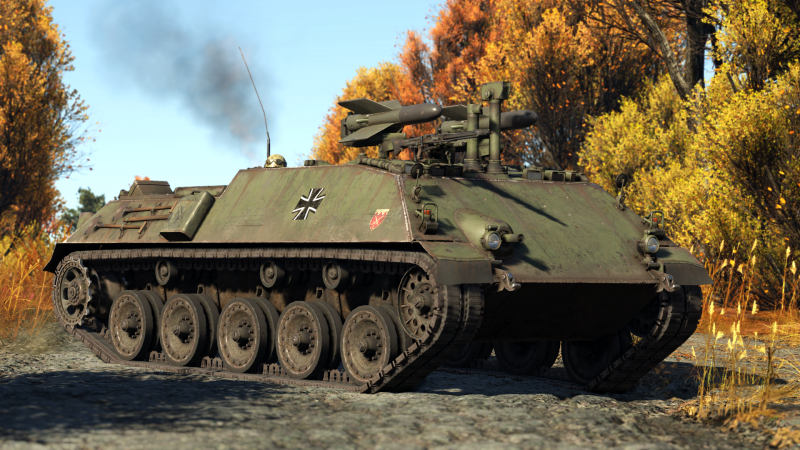RakJPz 2
| This page is about the German tank destroyer RakJPz 2. For the other version, see RakJPz 2 (HOT). |
Contents
Description
The RakJPz 2 was a vehicle born out of what would become Germany's last casemate tank destroyer - the Kanonenjagdpanzer program. Development of what would become the RakJPz 1 was done mostly in parallel to the main Kanonenjagdpanzer program starting in 1959, and 4 successive variants of Raketenjagdpanzers would serve with the Bundeswehr up to the year 2005 when the final RaketenJagdpanzer 3/4s (then called the Jaguar 1A3) were retired from service. The RaketenJagdpanzer 2 (RakJPz 2) is the second development of this lineage of tank destroyers, switching from the HS.30 hull to the Kanonenjagdpanzer hull, and sporting an armament of two SS.11 launchers on the top of the hull. The RakJPz 2 was superceded by later developments which removed the MCLOS-guided SS.11 missiles in favor of the more advanced SACLOS-guiding HOT ATGMs, redesignating the vehicle as the RakJPz 3/Jaguar 1.
The Raketenjagdpanzer 2 (RakJPz 2) is a rank V German tank destroyer with a battle rating of 8.0 (AB/RB/SB). It was introduced in Update 1.59 "Flaming Arrows". Featuring the SS.11 anti-tank guided missile, the Raketenjagdpanzer 2 serves as the missile's mobile platform. While the hull is very reactive and mobile, the inability to fire the missiles on the move and the restrictions of MCLOS control leave the vehicle well suited for longer range encounters but hard to manage in close quarter engagements. The ability to hide the vehicle's hull behind cover and fire the missiles lets the Raketenjagdpanzer 2 take advantage of terrain to a far greater extent than its contemporaries, and as such offers a valuable niche for the vehicle on hilly or long-range maps.
General info
Survivability and armour
Armour type:
- Rolled homogeneous armour
| Armour | Front | Sides | Rear | Roof |
|---|---|---|---|---|
| Hull | 50 mm (51°) Front glacis 50 mm (54°) Lower glacis |
30 mm (35°) Top 30 mm Bottom |
30 mm (44°) Top 30 mm (41°) Bottom |
10 mm |
Notes:
- Suspension wheels are 15 mm thick while tracks are 20 mm thick.
- Belly armour is 10 mm thick.
Mobility
The Raketenjagdpanzer 2 shares a hull with the JPz 4-5, but as the vehicle is over 2 tons lighter, the vehicle's HP/t increases to over 21. This, coupled with the reverse gearbox, lets the RakJPz 2 rocket around the battlefield as fast as any light tank, while retaining the ability to reposition yourself rapidly with the reverse gear if the situation calls for it. Overall mobility of the vehicle is excellent and second to none as a result.
| Game Mode | Max Speed (km/h) | Weight (tons) | Engine power (horsepower) | Power-to-weight ratio (hp/ton) | |||
|---|---|---|---|---|---|---|---|
| Forward | Reverse | Stock | Upgraded | Stock | Upgraded | ||
| Arcade | 77 | 77 | 23 | 710 | 954 | 30.87 | 41.48 |
| Realistic | 71 | 71 | 442 | 500 | 19.22 | 21.74 | |
Modifications and economy
Armaments
Main armament
The RakJPz 2's primary armament consists of SS.11 ATGMs positioned in a twin launcher configuration over the hull roof. The launchers reload independently, which means you can run out of one side's ammunition before expending the other. The ATGMs will swivel a fairly wide arc horizontally per each launcher (90° each per launcher) as well as a 10 degree vertical traverse, which is adequate for its role. When firing the missiles, until the ATGM impacts a target or self-detonates at its maximum range, your movement keys will act as your ATGM control keys, meaning you have to choose when to fire your missiles strategically.
| Dual LFK SS.11 ATGM | Turret rotation speed (°/s) | Reloading rate (seconds) | |||||||||||
|---|---|---|---|---|---|---|---|---|---|---|---|---|---|
| Mode | Capacity | Vertical | Horizontal | Stabilizer | Stock | Upgraded | Full | Expert | Aced | Stock | Full | Expert | Aced |
| Arcade | 14 | -10°/+20° | Left: -90°/+10° Right: -10°/+90° |
N/A | 22.0 | 30.5 | 37.0 | 40.9 | 43.5 | 26.00 | 23.00 | 21.20 | 20.00 |
| Realistic | 14.9 | 17.5 | 21.2 | 23.5 | 25.0 | ||||||||
Ammunition
| Penetration statistics | |||||||
|---|---|---|---|---|---|---|---|
| Ammunition | Type of warhead |
Penetration @ 0° Angle of Attack (mm) | |||||
| 10 m | 100 m | 500 m | 1,000 m | 1,500 m | 2,000 m | ||
| LFK SS.11 | ATGM | 600 | 600 | 600 | 600 | 600 | 600 |
| Missile details | ||||||||||||
|---|---|---|---|---|---|---|---|---|---|---|---|---|
| Ammunition | Type of warhead |
Velocity (m/s) |
Range (m) |
Projectile mass (kg) |
Fuse delay (m) |
Fuse sensitivity (mm) |
Explosive mass (TNT equivalent) (kg) |
Ricochet | ||||
| 0% | 50% | 100% | ||||||||||
| LFK SS.11 | ATGM | 220 | 3,500 | 29.99 | 0.05 | 0.1 | 2 | 80° | 82° | 90° | ||
Ammo racks

| Full ammo |
Visual discrepancy |
|---|---|
| 14 | No |
Notes:
- It is not possible to select how many missiles to bring into battle.
- Missiles are modeled individually and disappear after having been shot or loaded.
- When restocking missiles at a capture point, all missiles for the right launcher will be loaded first (even numbers), then all missiles for the left launcher (odd numbers).
Machine guns
| 7.62 mm MG3A1 | ||||
|---|---|---|---|---|
| Mount | Capacity (Belt) | Fire rate | Vertical | Horizontal |
| Pintle | 2,600 (200) | 1,200 | -5°/+25° | ±45° |
Usage in battles
Pros:
- Missiles can penetrate 600 mm of armour, more than other wire guided missiles (which generally have up to 500 mm penetration)
- Missiles have a 180 degree firing arc and can be used as close-range weapons if necessary
- Two missiles on top allow for rapid follow-up shots
- Can potentially curve the missiles into targets behind cover, as missiles have great horizontal mobility
- Shares the same chassis as the Kanonenjagdpanzer, inheriting its mobility and low profile
- Can fire its ATGMs with only the missiles and periscope exposed, almost completely hiding the vehicle behind cover
- Has a machine gun (unlike most ATGM carriers) so small fences are not a problem
Cons:
- In RB/SB, missiles are manually guided, making them harder to aim at longer distance, especially at moving targets. Guiding them in these modes also leaves the tank stationary and vulnerable.
- Controls for missiles use an inverted Y-axis for default controls - which may not be intuitive for newer players
- Thin armor
- Missiles on top act as exterior ammo racks and can be detonated
- Unable to fire missiles if the launchers are damaged, forcing the player to retreat and repair their vehicle.
- Missile ammo racks are separate between launchers, meaning you can run out of one side and not the other
- Optics prevent the missiles from being fired simultaneously at a certain angle and direction
- Can't fire on the move
- Launchers do not provide 360-degree coverage
History
Development
In the 1960s, the German Bundeswehr commenced the development of a missile carrier to fit in a role of a tank destroyer. The result came in 1961 with the Raketenjagdpanzer 1, which features the French SS.11 anti-tank missile. The Raketenjagdpanzer 1 features two mounts for the missiles, but only one is available at a time as while one remains ready to fire, the other is reloading inside the vehicle. The vehicle can hold 10 missiles inside the Hispano-Suiza HS-30 chassis. It also carried existing problems with the HS-30 chassis so only a limited amount of 95 vehicles was produced from 1961 to 1962. A second improved version was designed alongside the Jagdpanzer 4-5 between 1963 and 1965, and the two were designed on the same chassis. The finished model was designated the Raketenjagdpanzer 2 and this was accepted into Bundeswehr service in 1967. The Raketenjagdpanzer 2 were produced from 1967 to 1968 for a total of 318 units produced.
Design
Though slightly larger than the Raketenjagdpanzer 1, the Raketenjagdpanzer 2 had better automotive performances with the newer chassis and a 500 hp diesel engine and torsion bar suspension. The new vehicle chassis design allowed for an increased missile storage of 14 SS.11 missiles. The Raketenjagdpanzer 2 featured two rails for the missiles, both ready to fire and reloads are done automatically by each mount inside the vehicle. The SS.11 missiles allow the vehicle to engage enemy armour up to 3 kilometers away, with the missiles penetrating 600 mm of armour on impact, enough to take out most Soviet armour at the time. For personnel protection, a MG3 machine gun was also available for anti-infantry and anti-aircraft defense purposes.
Usage
The German Bundeswehr used the Raketenjagdpanzer 2 from 1967 as far as to the 1990s. The Raketenjagdpanzer 2's purpose was to engage enemy armour in the ranges between 1.5 to 3 kilometers away, which regular tank armaments' accuracy and power are reduced at the distances. The SS.11 missile's range and lethality made the Raketenjagdpanzer 2 perfect for its role as it could defeat the main Soviet tanks such as the T-54/55 and T-62. The Germans organized the Raketenjagdpanzer 2 in tank destroyer companies attached to Panzergrenadier brigades and Panzer brigades, with eight vehicles per company in the Panzergrenadier brigades and 13 vehicles per company in the Panzer brigades. When the manual-guided SS.11 missiles became obsolete, the Raketenjagdpanzer 2 underwent an upgrade between 1978 and 1982 in armour and in its missile armament from the SS.11 to the HOT (High Subsonic Optical Remote-Guided, Tube-Launched) missiles with improved lethality and guidance system. The upgraded Raketenjagdpanzer 2 was redesignated into the Raketenjagdpanzer 2 HOT. This saw an improvement again between 1993 and 1995 when some extra armour, a new optic, and thermal imaging system were installed into the vehicle, turning it into the Raketenjagdpanzer Jaguar 1. The Raketenjagdpanzers were all retired by the end of the 1990s, never seeing combat in the Cold War.
Media
- Skins
See also
Links to the articles on the War Thunder Wiki that you think will be useful for the reader, for example:
- reference to the series of the vehicles;
- links to approximate analogues of other nations and research trees.
External links
| Germany tank destroyers | |
|---|---|
| Pz. I Derivatives | Panzerjäger I |
| Pz. II Derivatives | 15cm sIG 33 B Sfl |
| Pz. 38(t) Derivatives | Marder III · Marder III H · Jagdpanzer 38(t) |
| Pz. III Derivatives | StuG III A · StuG III F · StuG III G · StuH 42 G |
| Pz. IV Derivatives | Jagdpanzer IV · Panzer IV/70(A) · Panzer IV/70(V) · Dicker Max · Nashorn · Brummbär · VFW |
| Pz. V Derivatives | Jagdpanther G1 · Bfw. Jagdpanther G1 |
| Pz. VI Derivatives | Sturer Emil · Elefant · Ferdinand · 38 cm Sturmmörser · Jagdtiger |
| Wheeled/Half-track | 8,8 cm Flak 37 Sfl. · Sd.Kfz.251/9 · Sd.Kfz.251/10 · Sd.Kfz.251/22 · Sd.Kfz.234/3 · Sd.Kfz.234/4 · 15 cm Pz.W.42 |
| ATGM Carrier | RakJPz 2 · RakJPz 2 (HOT) · Wiesel 1A2 |
| Other | Waffenträger · M109G · JPz 4-5 · Raketenautomat · VT1-2 |






